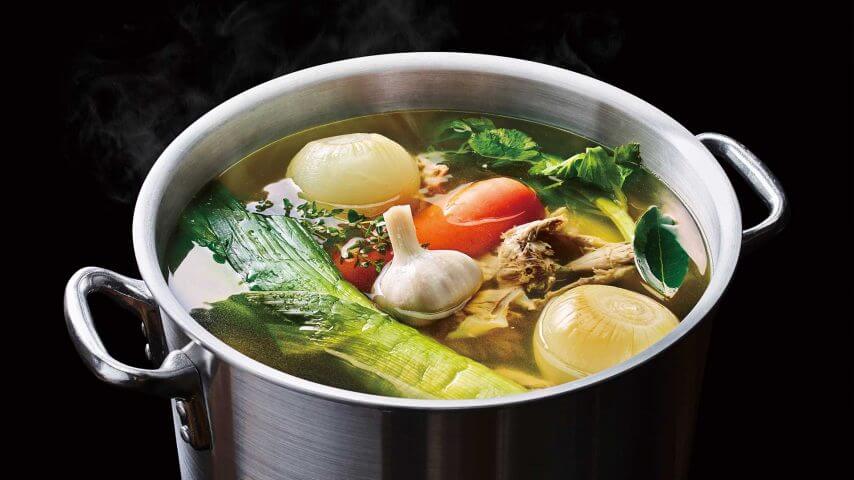Reading Time: 5minutes
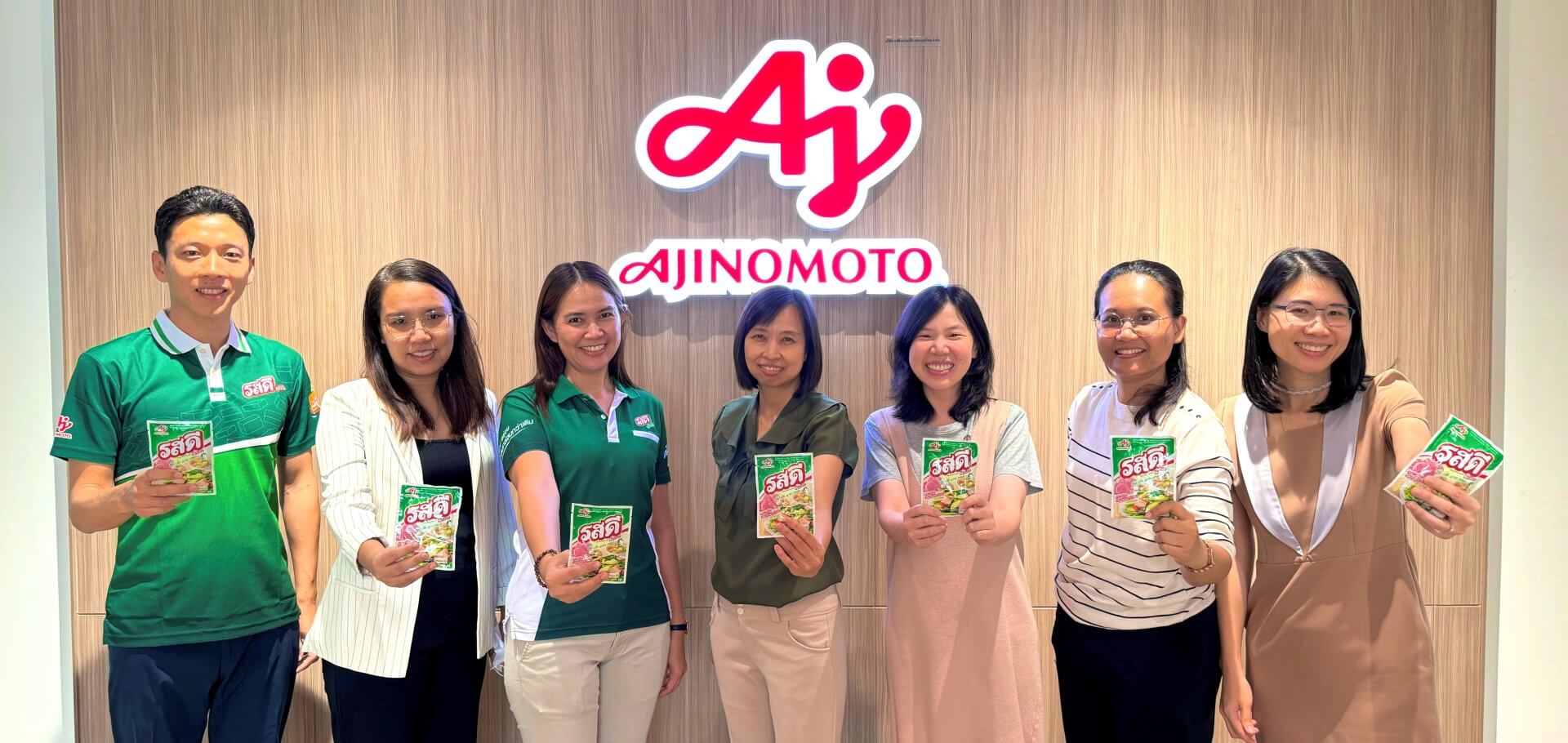
Table of Contents
The Technology of Deliciousness
Since its founding, the Ajinomoto Group has been studying deliciousness, applying its unique technology and knowledge of umami and “AminoScience” to help people enjoy their food more. Today, the Group is applying what it calls Deliciousness Technology to deliver foods that appeal in markets around the world and help people Eat Well, Live Well.
What does it mean to say a food is “delicious”? Deliciousness is a complex sensation that we evaluate with our five senses: sight, hearing, smell, touch, and taste. This sensation can be influenced by experiences, information, and external conditions, including culture. The application of Deliciousness Technology includes the evaluation and analysis of taste, aroma, and texture profiles, in addition to the development of food ingredients. It combines expert sensory evaluation with the scientific method to replicate the intricate sensation of deliciousness.
At Ajinomoto’s Institute of Food Sciences and Technologies in Japan, the Group analyzes deliciousness from the perspectives of aroma, taste, and texture. Researchers identify and adjust key ingredient components of deliciousness by integrating advanced component analysis, olfactory and taste receptor analysis, and data science.
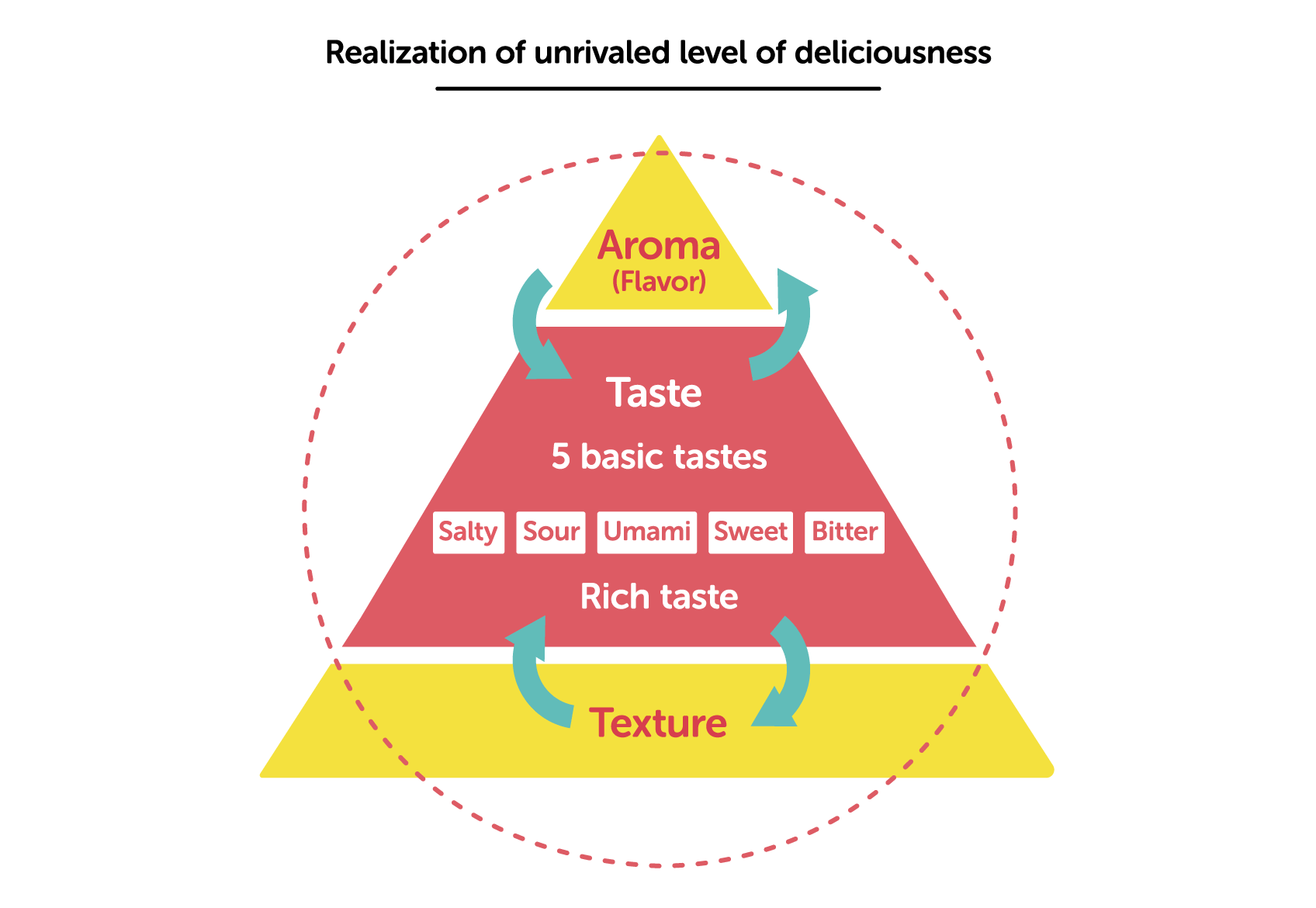
For more, see Deliciousness Technology.
Deliciousness Research
We spoke with Akihiro Mizunaga, Deputy General Manager of the Technology & Solution Development Center, to learn more about the latest research. Mizunaga explained that the Center explores flavor and aroma components to identify the molecular-level components that contribute to deliciousness. Using sensory evaluation involving the human senses and state-of-the-art technology, researchers analyze aroma, taste and texture. For example, gas chromatography is used to measure and reproduce very specific appealing aromas. The Center conducts research that focuses on substances that react with the approximately 400 olfactory receptors in the human nose in exploring aroma components, and studies the many receptors responsible for perceiving taste on the tongue’s surface.
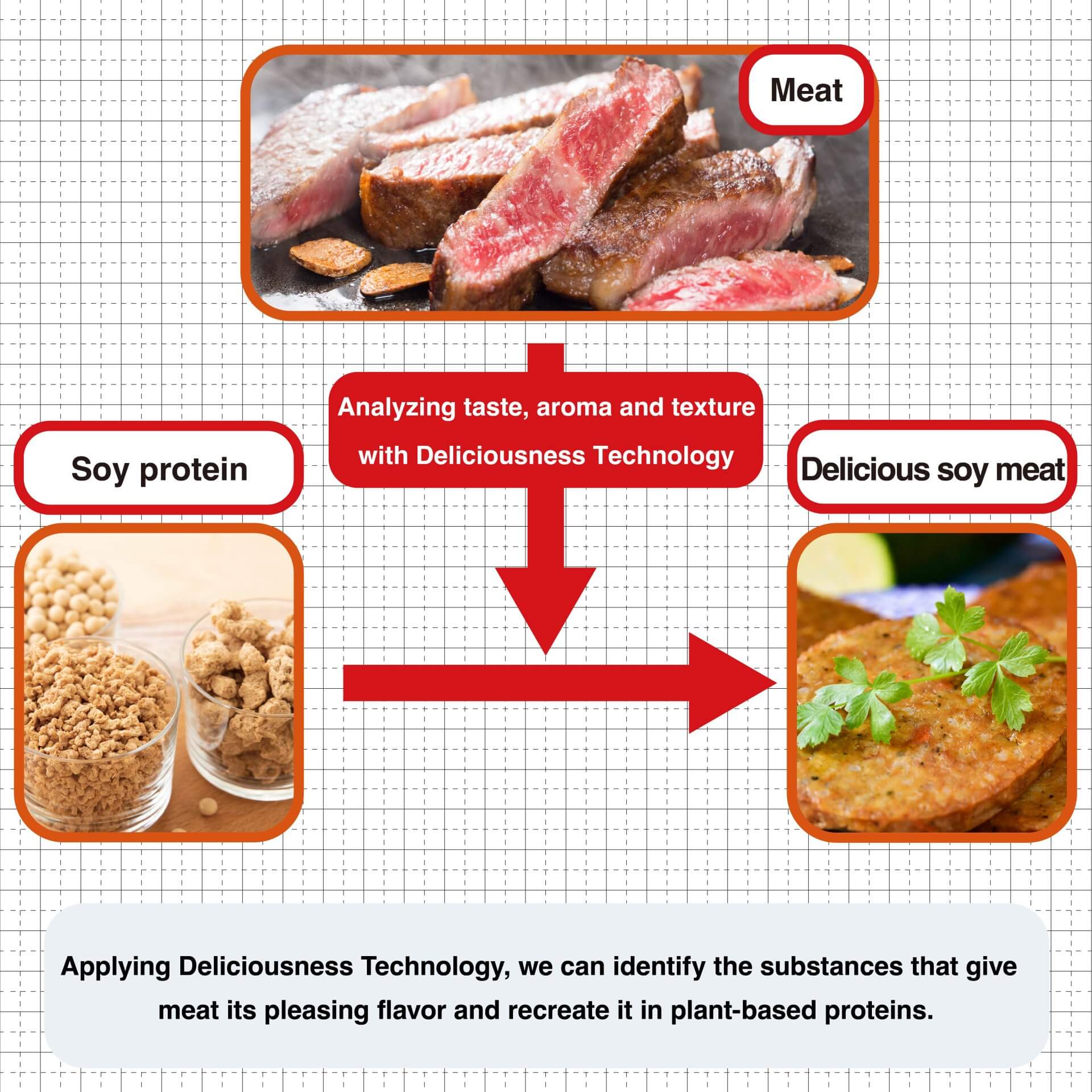
In recent years research has extended to include achieving deliciousness while reducing salt, sugar, and fat content, contributing to better health. Mizunaga emphasized some of the important health benefits the Group is focused on: “We are doing research on how to activate receptors responsible for detection of fattiness in humans without fats or oils, enhancing the satisfying sensation of fattiness while delivering real health benefits, as well as research on ways to reduce sugar and salt content without compromising on deliciousness.”
The Challenge of Improving on RosDee® Pork Flavor in Thailand
One example of product development and improvement leveraging Deliciousness Technology, is the recent improvement of RosDee® Pork Flavor, a popular flavor seasoning offered in Thailand. We spoke with Takashi Takahara, Group Manager of the Thai Food Technology Center (TFTC), and Shuichi Jo, Section Manager responsible for seasoning technology development at TFTC about their approach to this project.


RosDee® Pork Flavor, introduced in 1979, has consistently been a market leader in Thailand, and is beloved by the local population. In 2021 and 2023, it underwent its first-ever quality revisions. The trigger for the project was a slight market contraction in the flavor seasoning sector around 2019, resulting in a decline in RosDee® sales, which had been continuously growing until then. But changing a product deeply ingrained in Thai culture, used in various dishes from soups and stir-fries to direct dipping, was a daunting endeavor. Jo emphasized the challenge: “The RosDee® brand is very strong and pork flavor is often considered the essence of deliciousness in Thailand, so we needed to get it just right.”
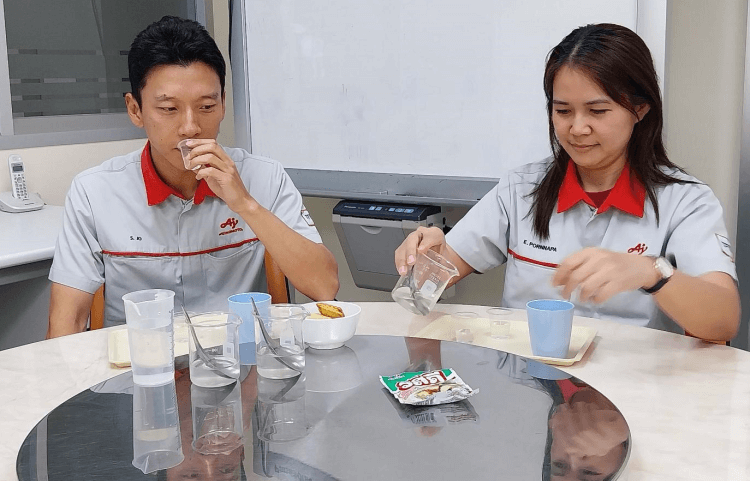
Jo and a colleague working on taste test for local Thai customers

RosDee®‘s unique flavor complexity, high umami intensity, and the use of the Ajinomoto Group specialty ingredients make it stand out from the competitors. The product’s appeal is described as “klom klorm” in Thai, which translates to “well blended” in English—the description has been proactively used in marketing campaigns. It was critical to determine qualities such as the ideal strength of garlic and meaty tastes to enhance that blend. RosDee® is already very popular across various age groups and as a complement to various dishes, so reaching the target quality of an enhanced balance between garlic and meaty tastes while catering to a wide range of varying individual preferences was a significant challenge. Determining how to adjust the product attributes took the team considerable time.
Applying "Deliciousness Technology" to Enhance RosDee®
Deliciousness Technology played a crucial role in this project, and in particular the analytical method called AJI-PMap® was crucial. AJI-PMap® enables developers to express sensory attributes that consumers consider ideal for the product in a quantitative way, which helps in achieving target quality enhancements quickly. Multiple samples with carefully adjusted attributes were prepared and evaluated by consumer test groups, and Ajinomoto Group team members also provided evaluations.
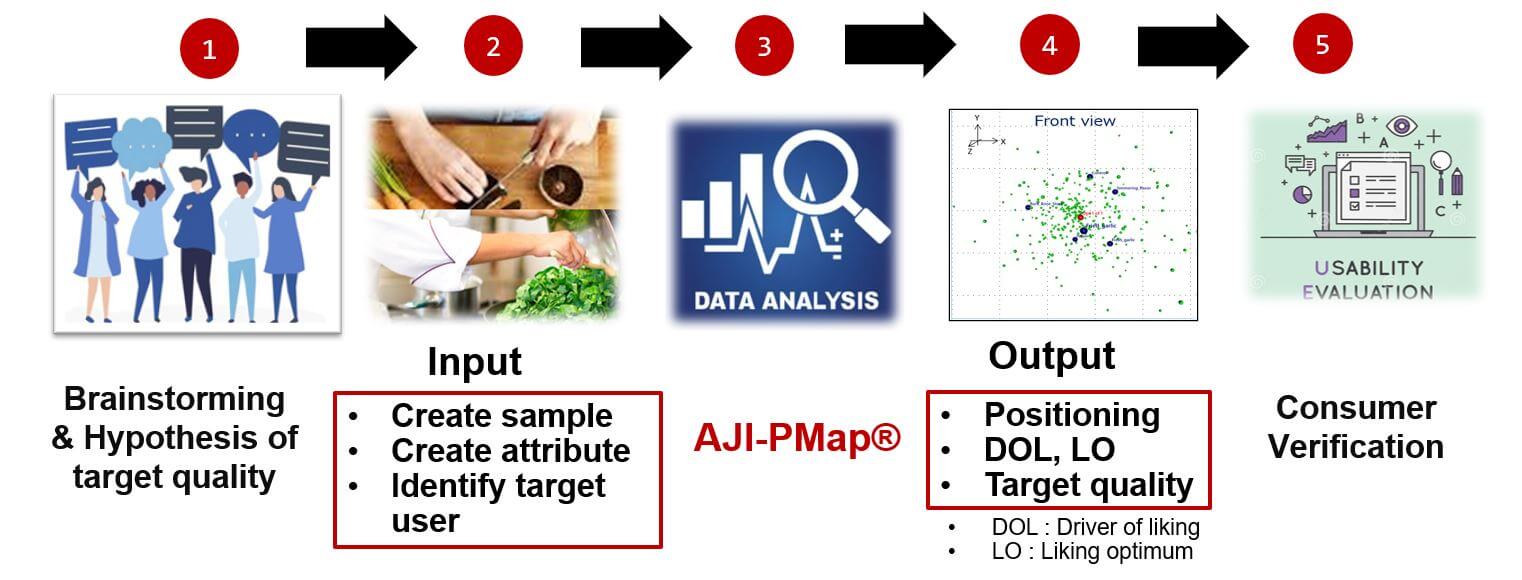
Addressing consumer preferences with AJI-PMap®
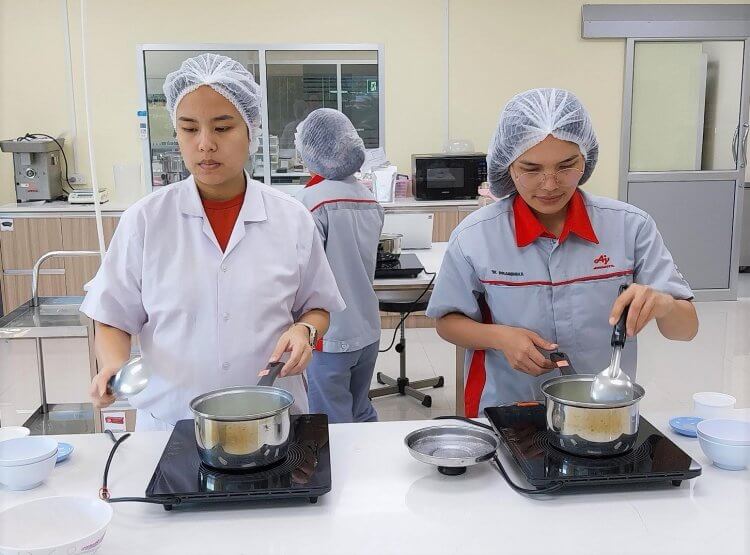
Testing in simulated kitchen environment

The Results of Teamwork
The Ajinomoto Group researchers in Thailand collaborated with colleagues in Japan and in other affiliates of the Ajinomoto Group to combine formulation technology and unique materials, adapting Deliciousness Technology carefully to suit Thai tastes. It took more than six months to strike the ideal balance, but upon the introduction of the enhanced product, the product was well-received by consumers and sales strengthened.
The application of Deliciousness Technology in enhancing RosDee® also feeds into the Ajinomoto Group’s sustainability goals. Since RosDee®’s high production volume results in the use of a significant quantity of animal-derived ingredients, the new product features alternative ingredients that deliver the same pleasing sense of richness. The annual reduction in animal-derived ingredient use is helping reduce the greenhouse gas emissions associated with livestock farming.
Enhancing RosDee® in Thailand is one more way the Group is working to help people and the planet, applying Delicious Technology and “AminoScience,” embodying the spirit of the founders of the Ajinomoto Group.
Stories you may like

Smart solutions to reducing salt without compromising taste
- Amino Acids
- Food & Wellness
- Health and Well-being
- Innovation
- Nutrition
- Sustainability / SDGs

Achieving sustainability by building healthy, long-term relationships
- Amino Acids
- Food & Wellness
- Health and Well-being
- Innovation
- Nutrition
- Sustainability / SDGs

Nutrition Without Compromise: Giving people delicious, personalized choices could be key to longer, healthier lives
- Amino Acids
- Food & Wellness
- Health and Well-being
- Innovation
- Nutrition
- Sustainability / SDGs

